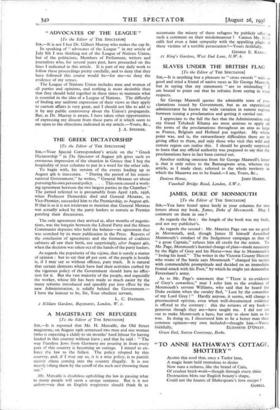THE GREEK DICTATORSHIP
[To the Editor of THE SPECTATOR] Sta,—Your Special Correspondent's article on the " Greek Dictatorship " in The Spectator of August 5th gives such an erroneous impression of the situation in Greece that I beg the hospitality of your columns to put in a word for the other side.
To begin with, his version of the events leading up to August 4th is inaccurate. " During the period of his consti- tutional Government," he writes, " General Metaxas set about pursuing his own personal policy. . . . This soon caused a work- ing agreement between the two largest parties in the Chamber." The period referred to is presumably from April 13th, 1936, when Professor Demerdzis died and General Metaxas, as Vice-Premier, succeeded him to the Premiership, to August 4th. If that is so it is not irrelevant to mention that General Metaxas wat actually asked by the party leaders to remain as Premier pending their discussions.
The only agreement they arrived at, after months of negotia- tions, was the bargain between the Liberal Party and the fifteen Communist deputies who held the balance—an agreement that was scotched by its mere publication in the Press. Reports of the conclusion of agreements and the formation of coalition cabinets all saw their birth, not surprisingly, after August 4th, when the decision was taken out of the hands of the party leaders.
As.regards the popularity of the regime, that is surely a matter of opinion : but to say that 98 per cent. of the people is hostile is, if I may say so without offence, pure trash. It is natural that certain elements which have had their activities curbed by the vigorous policy of the Government should have no affec- tion for it. But the vast majority of the people, and especially the worker, whose life has been made so much easier by the many reforms introduced and speedily put into effect by the new Administration, is solidly behind the Government.— I have the honour to be, Sir, Your obedient servant, L. C. DATESON.
2 Kildare Gardens, Bayswater, London, W. 2.


































 Previous page
Previous page